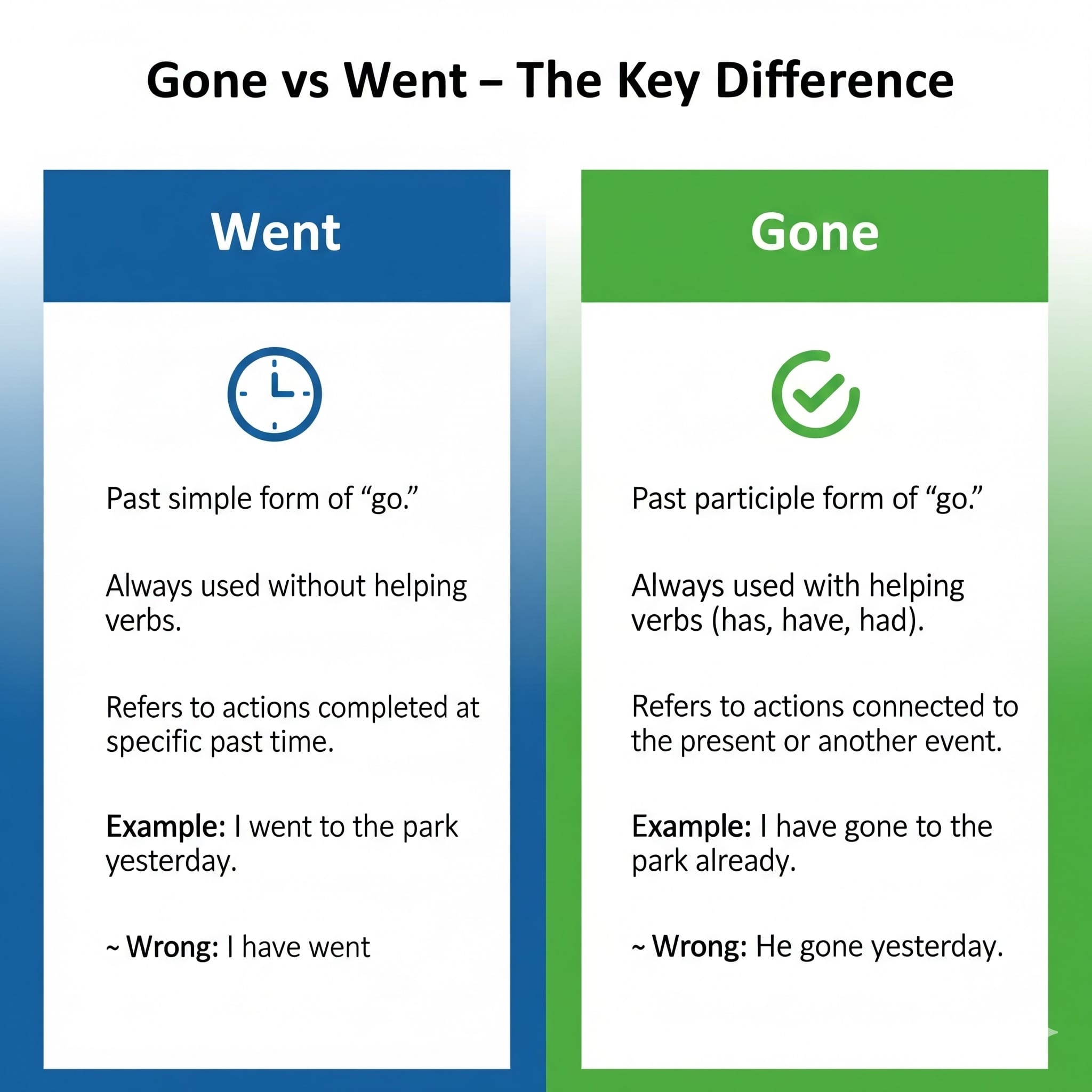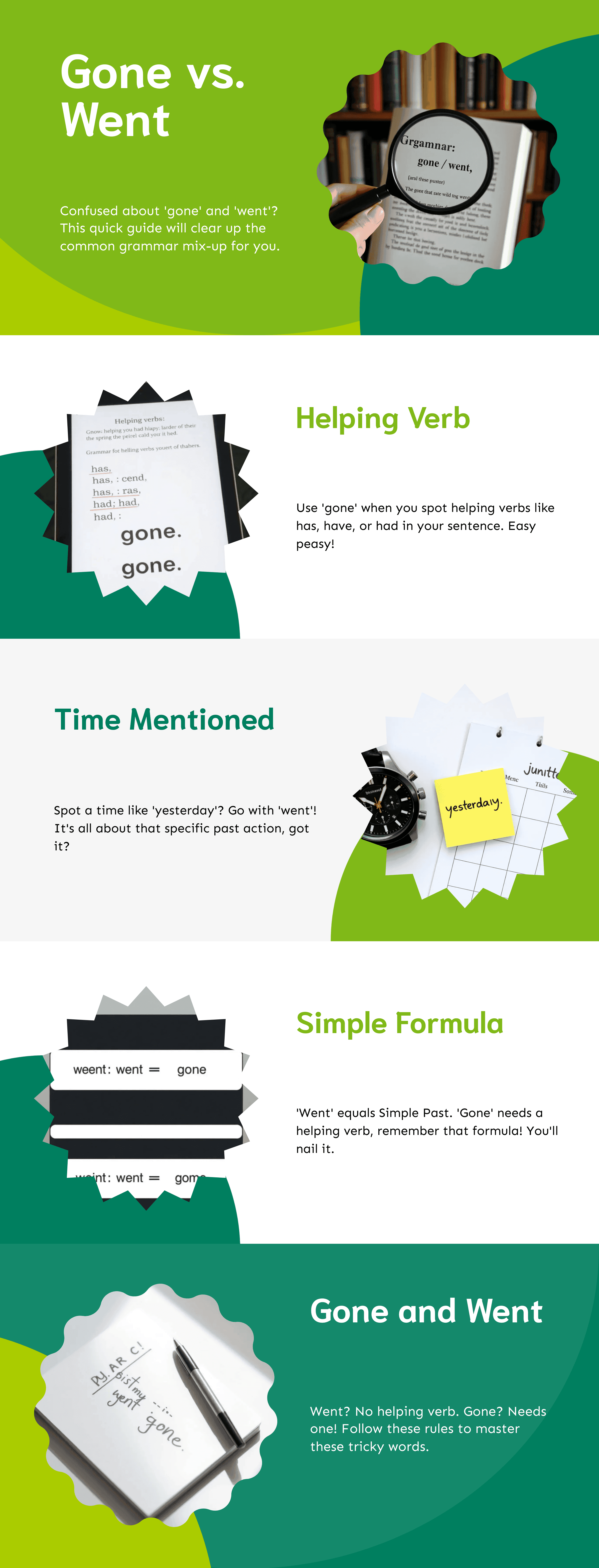How to Use "Gone" vs. "Went" Correctly : 5 Things To Know
Confused about "gone vs went"? Learn the key differences, grammar rules, and real-life examples to master past tense verbs. Includes tips, FAQs, and expert advice.

Why “Gone vs Went” Confuses English Learners
Have you ever wondered why English speakers say:
“I went to the store yesterday.”
“I have gone to the store already.”
Why not just say “went” every time? The answer lies in grammar rules and verb forms.
The verbs “gone” and “went” both relate to the past, but their usage depends on tense, context, and sentence structure.
In this guide, we’ll break it all down, provide examples, mini exercises, tips, and even real-life dialogue examples. By the end, you’ll never confuse gone vs went again.
Understanding the Verb “Go”
The verb “go” is irregular, meaning its past forms don’t follow a simple -ed pattern.
Base form: go
Past tense: went
Past participle: gone
Why does this matter? Because “went” and “gone” are not interchangeable.
I went to school yesterday. ✅
I have gone to school today. ✅
I have went to school today. ❌
So the trick is understanding when to use each form.
The Forms of “Go”
The verb “go” is irregular, meaning it doesn’t follow the standard -ed pattern.
Form | Example |
|---|---|
Base | go → I go to school every day. |
Past | went → I went to school yesterday. |
Past Participle | gone → I have gone to school today. |
Quick Tip: Always remember: went = past, gone = past participle.
When to Use “Went”
“Went” is the simple past tense of “go.” Use it when you are talking about something that happened at a specific time in the past.
Examples:
I went to the cinema last night.
She went to Delhi two days ago.
They went shopping on Sunday.
Tip: If the sentence has a clear past time, “went” is usually correct.
Mini Exercise: Identify “Went”
Fill in the blanks with went:
Yesterday, I ___ to the park.
She ___ to the dentist last week.
We ___ on a trip in 2022.
Answers: 1. went 2. went 3. went
When to Use “Gone”
“Gone” is a past participle, used with helping verbs like has, have, had.
It often appears in present perfect or past perfect tenses.
It focuses on the result of the action or its connection to the present.
Examples:
I have gone to the office already.
She had gone home before it started raining.
They have gone on vacation.
Tip: Always use “gone” with a helping verb. Without it, the sentence is incorrect.
Mini Exercise: Fill in “Gone”
I have ___ to the grocery store.
She has ___ on vacation this week.
By the time we arrived, he had ___ home.
Answers: 1. gone 2. gone 3. gone
Common Mistakes Learners Make
Here are some frequent errors:
Mistake | Correct Form |
|---|---|
I have went to the market. | I have gone to the market. |
She has went home already. | She has gone home already. |
He gone to the office yesterday. | He went to the office yesterday. |
Rule of Thumb:
No helping verb → went
Helping verb → gone
Common Mistakes with “Gone” vs “Went” (And How to Avoid Them)
Even advanced learners of English often make the same errors with these two verbs. Let’s look at the most common pitfalls.
❌ Incorrect:I have went to the office already.
✅ Correct:I have gone to the office already.❌ Incorrect:He gone to school yesterday.
✅ Correct:He went to school yesterday.❌ Incorrect:They have went shopping.
✅ Correct:They have gone shopping.
Tip: Always check if a helping verb (has, have, had) is present. If yes → use gone. If no → use went.

Went – The Simple Past
Went is the past simple form of “go” and is used for actions that happened at a specific time in the past.
Examples
I went to the cinema last night.
She went to Delhi two days ago.
We went shopping on Sunday.
Common Mistakes
❌ I have went to the market.
✅ I have gone to the market.
Mini-Story for Memory:
Last week, Rahul went to a new cafe. He ordered coffee and a sandwich. The cafe was busy, but he enjoyed his visit. Yesterday, he told his friend, “I went to the cafe yesterday and it was amazing!”
Exercise: Fill in with “went”
Last Friday, I ___ to the library.
She ___ to the dentist last month.
We ___ to Mumbai in 2019.
Answers: 1. went 2. went 3. went
Gone – Past Participle
Gone is a past participle and must be used with helping verbs like has, have, had.
Examples
I have gone to the office already.
She had gone home before it started raining.
They have gone on vacation.
Mini-Story:
Priya is a travel blogger. Today she has gone to the mountains, and tomorrow she will go to the beach. Yesterday, she went to a city tour. Notice how we use went for yesterday (specific past) and has gone for actions affecting the present.
Exercise: Fill in with “gone”
I have ___ to the grocery store.
She has ___ on vacation this week.
By the time we arrived, he had ___ home.
Answers: 1. gone 2. gone 3. gone
Advanced Grammar: Perfect Tenses with “Gone”
Let’s see how gone works across different perfect tenses:
Present Perfect:
She has gone to the office. (She is still there now.)Past Perfect:
They had gone by the time we arrived. (They left earlier.)- Future Perfect:
By next week, he will have gone abroad.
Notice how gone connects the action to another time or event — that’s why it always needs a helper verb.
Gone vs Went in Conversations
Here’s how these words appear naturally in dialogues.
Dialogue 1:
A: Where’s Rahul?
B: He has gone to the meeting.
Dialogue 2:
❌ I have went to the doctor today.
✅ I have gone to the doctor today.
Dialogue 3:
A: What did you do yesterday?
B: I went to the new restaurant.
Fun Facts About “Go”
The verb go is one of the most irregular verbs in English.
Its past tense is went — but went actually comes from an Old English verb wendan (to turn).
Gone became the past participle from the older form gon.
Many native speakers also mix up gone and went in casual speech, but it’s considered incorrect in writing.
Knowing the history makes the rules easier to remember!
Gone vs Went in Professional English
Correct usage is critical in business emails, meetings, and presentations.
Email example:
❌ I have went through the documents.
✅ I have gone through the documents.Meeting example:
❌ He went already.
✅ He has gone already.
Tip: When referring to ongoing situations or results, gone sounds professional.

Real-Life Usage in Workplace English
For professionals, the right usage of “gone” and “went” can make emails, meetings, and presentations more polished.
In Emails:
✅ I went through the document you shared yesterday.
✅ Our manager has gone through the feedback already.
In Meetings:
✅ The project went well last quarter.
✅ The team has gone above expectations this time.
In Client Calls:
✅ I went to the client’s office last week.
✅ Our proposal has gone through multiple reviews.
Small changes like this boost credibility in business communication.
“Gone” vs “Went” in Storytelling
When telling stories, especially in the past tense, many learners mix up gone and went.
Story Example (Correct):
Yesterday, we went to the park. By the time we reached, my friends had already gone home.Why It Works:
Went describes your action yesterday.
Had gone shows what your friends had already done before you arrived.
In narratives, went drives the plot forward, while gone often gives background or completed actions.
Clapingo Spotlight
At Clapingo, learners often practice real-life mistakes.
❌ “I have went to many leadership workshops.”
✅ Corrected: “I have gone to many leadership workshops.”
Why it works: Immediate feedback, repetition, and correction reinforce grammar rules in your brain
Past Tense Verbs Overview
“Went” and “gone” are part of the larger family of past tense verbs.
Types of Past Tense:
Simple Past (went): Completed action at a specific past time.
Present Perfect (have/has + gone): Action with relevance to now.
Past Perfect (had + gone): Action completed before another past event.
Examples:
Simple Past: I went home at 8 PM.
Present Perfect: I have gone home early today.
Past Perfect: I had gone home before you arrived.
Went vs Gone – Quick Grammar Comparison
Went | Gone |
|---|---|
Past simple form | Past participle |
No helping verb | Needs helping verb (has/have/had) |
Specific past time | Connected to present or another past event |
I went to the park yesterday. | I have gone to the park already. |
Tips and Tricks
Helping Verb = Gone
Specific Past Time = Went
Quick Formula: Went = Simple Past | Gone = With Helping Verb
Daily Practice: Repeat these sentences:
I went to the market yesterday.
I have gone to the market today.
I had gone to the market before you called.
Idioms and Expressions with Gone and Went
English also uses idiomatic expressions:
Gone Idioms
Gone too far → crossed a limit
Gone missing → disappeared
Gone out of fashion → not popular anymore
Went Idioms
Went off the rails → lost control
Went downhill → worsened
Cultural Phrases and Idioms with “Gone”
The word gone also appears in many idioms and casual phrases.
Gone are the days → Something no longer happens.
All gone → Completely finished or used up.
Gone crazy → To lose control.
Gone too far → Crossed a limit.
These expressions make your English sound more natural. Went doesn’t usually appear in idioms, making gone the more “flexible” word outside of strict grammar rules.
Did You Know?
“Went” comes from the old verb “wend”, not from “go.”
“Gone” has always been the past participle of “go.”
That’s why English treats them unusually compared to regular verbs.
Clapingo Practice Section
Fill in the blanks with went or gone:
She ___ to the office yesterday.
He has ___ to the gym already.
We ___ shopping last weekend.
I had ___ to class before the bell rang.
They ___ to the park yesterday.
I have ___ on vacation.
Answers: 1. went, 2. gone, 3. went, 4. gone, 5. went, 6. gone
Why This Matters for Fluency
Correct grammar helps you sound fluent and confident, especially in professional conversations. But learning the difference between gone and went is only one step.
That’s where Clapingo helps. With Clapingo:
You get 1:1 live practice sessions with fluent English speakers
You learn to use grammar in real conversations, not just theory.
You receive instant corrections so mistakes don’t become habits.
Instead of memorizing rules, you actually speak and apply them daily.
Advanced Usage Notes
“Gone” can sometimes appear in idiomatic phrases:
Gone too far, gone missing, gone out of fashion
“Went” rarely appears idiomatically but is always tied to specific past action.
Clapingo Case Study
Learner Priya always mixed up “gone” and “went” in meetings.
❌ I have went through the report.
✅ Corrected: I have gone through the report.
After 2 weeks of live practice:
Priya stopped making the mistake completely.
She confidently spoke in client calls.
Memory Tricks to Never Forget
Some hacks to keep it simple:
Helping Verb Hack:
Has/Have/Had → always pair with gone.
Example: She has gone to the gym.
Time Word Hack:
Yesterday/last week/in 2020 → always pair with went.
Example: I went to a concert in 2020.
“No Help = Went” Rule:
If there’s no helping verb, it’s almost always went.
These small shortcuts can save you from hesitation in conversations.

How “Gone” vs “Went” Differs in British and American English
Interestingly, while the rules are globally consistent, there are tiny differences in how native speakers in the UK vs. the US use them.
British English:
Often more strict. Saying “I have went” is never acceptable in formal or informal contexts.American English:
Informally, you may hear “I have went” in some dialects, but it is still considered incorrect in formal writing.
Regardless of where you learn English, always stick to the correct grammar: went = past simple, gone = past participle.
Other Common English Confusion Mistakes
Has vs. Have: What’s the difference? Is it just tenses?
Decode English: Understand and Use 'Presume vs Assume' with Simple Examples
Ensure vs Insure vs Assure: A Simple and Insightful Guide
Final Recap
Went = Past Simple (no helping verb)
Gone = Past Participle (with helping verb)
Follow the “Helping Verb = Gone | Time Word = Went” rule
Practice in real sentences and dialogues
Practice live with mentors to fix gone vs went mistakes permanently.
Conclusion: Mastering “Gone” vs “Went” for Real Fluency
The difference between gone and went may look small, but it can change how professional or natural you sound. Here’s the quick recap:
Went = Past simple → for actions in a specific time in the past.
Gone = Past participle → always used with has/have/had.
Tip: Helping verb = Gone. Time word = Went.
But remember: knowing the rule isn’t enough, using it in real conversations is what builds fluency.
That’s why platforms like Clapingo are so powerful. They don’t just explain grammar; they give you the chance to practice live, get corrected instantly, and develop real confidence.
So the next time you wonder whether to say gone or went, you’ll not only know the rule, you’ll be able to use it effortlessly. 🚀
Comments
Your comment has been submitted